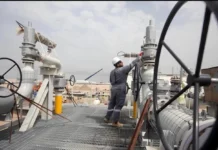Tishwash: Trade announces the conclusion of the Baghdad Fair and discusses its results
Today, Saturday, the Ministry of Commerce announced the conclusion of the activities of the 47th Baghdad International Fair, while mentioning its advantages.
The Minister of Trade, Atheer Al-Ghurairi, said in a statement received by Al-Eqtisad News: “The activities of the session were distinguished compared to previous sessions in terms of organization, qualification, diversity and size of participation by countries and companies, as well as the achievement of many partnership contracts between Iraqi sectors and sectors of countries and companies participating in the international session.” .
He pointed out that “the Baghdad International Fair is a message to the world that Iraq is coming strong as an important economic player capable of containing the largest international gatherings and interacting with them in a way that serves the aspirations of our people for a free and dignified life. In addition, the exhibition was a message from the participating countries of their desire to extend bridges of cooperation.” With Iraq.
For his part, the company’s general manager, Mustafa Al-Ani, confirmed, “The conclusion of the activities of the Baghdad International Fair, bidding farewell to another year in its pioneering journey that accompanied its launch in the sixties of the last century.” He said, “This session was distinguished by the participation of 22 countries and 850 local, Arab, and international companies, which is the highest participation compared to the sessions.” Previously, the participation of the Kingdom of Saudi Arabia was the largest.
He added, “The conclusion of this session gives other aspects to the new Iraq in its economic developments, which could give it the opportunity to enter international investments, as the exhibition witnessed commercial displays of various international and local commodities and goods in addition to the projects and achievements of local and international companies from various sectors, as well as projects related to infrastructure.” agricultural, industrial, technological and other sectors.” link
************
CandyKisses: European markets are suffering. Middle East oil supplies halved
Economy News – Follow-up
European markets are suffering from a crisis of intense competition for oil, especially from the Middle East and the Gulf, due to the halving of supplies following the crisis of crossing the Red Sea.
Traders and analysts and data of the London Stock Exchange Group revealed that the Brent crude market and some oil markets in Europe and Africa are witnessing a shortage due in part to the delay in shipments after some cargo ships avoided traveling through the Red Sea, while the disruption coincided with other factors, including interruptions in production and increased demand in China to intensify competition for crude supplies that do not need to cross the Suez Canal, and analysts say that the crisis is clearer in European markets, according to Reuters.
In a sign of supply shortages, the structure of the benchmark Brent crude futures market hit a two-month high on Friday, as tankers moved away from the Red Sea after air strikes by the United States and Britain on targets in Yemen.
Victor Katuna, senior crude oil markets analyst at Kepler, said: “Brent crude futures are the most affected by the disruptions of the Red Sea and the Suez Canal, so European refiners are the ones suffering the most in the actual markets.”
Volumes of crude destined for the Middle East to Europe have fallen, and Kepler data shows the volume of crude heading to Europe from the Middle East has almost halved to about 570,000 bpd in December from 1.07 million bpd in October.
“Red Sea problems cause delays, so refiners need to cover their needs from local markets,” one trader said, adding that “the market is in shortage due to the loss of Gulf supplies.”
Other developments have led to shortages in Europe’s supply, including a drop in Libyan supplies due to protests, the first such disruption in months, as well as a drop in Nigerian exports.
Crude supplies from Nigeria fell after the country began operating the Dangoti refinery, which captured some cargoes.
Angolan crude, which is also heading to Europe without having to pass through the Suez Canal, is seeing increased demand from China and India due to problems with Iranian and Russian crude, a trader said.
China’s oil trade with Iran has been hampered by Tehran’s halt to shipments and demands for higher prices, while India’s imports of Russian crude have fallen due to currency challenges, although India says the decline is due to unattractive prices.
************
CandyKisses: Christine Lagarde: 3 positive trends in the global economy
Economy News Follow
European Central Bank President Christine Lagarde said she does not expect to return to the “normal” situation of the economy in 2024, despite seeing some balance in the past 12 months.
In a speech on the sidelines of the global economy in Davos, Switzerland, she described the post-pandemic period as “a strange, unusual and difficult period to analyze,” and identified three trends that began to return to normal last year: consumption, trade and inflation.
The pandemic period saw spending decline and people’s savings grow, while global trade was also disrupted.
In October 2022, inflation in the Eurozone reached 10.6% but declined in 2023, reaching 2.9% in December.
Lagarde said on Friday, January 19: “In 2023 we saw the beginning of equilibrium. When you look at consumption for example, all over the world… Consumption is still a driving force for growth, but the tailwinds we have benefited from are gradually fading,” she said, pointing to the decline in consumption, as the labor market became somewhat less tight and consumer savings fell.
Lagarde explained that trade, meanwhile, has been disrupted by consumers’ preference for buying services over goods in 2021 and 2022, “but now it’s starting to improve. In October, we had global trade figures that rose for the first time in several months.”
The World Trade Organization (WTO) expects trade to increase by 3.3% in 2024, according to forecasts released in October.
Lagarde also noted the significant decline in inflation in 2023. “Around the world, inflation is falling, and we saw that in November, in both headline inflation and core inflation,” she said.
In December, the ECB chose to keep interest rates unchanged for the second time in a row.





